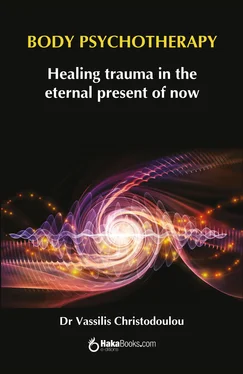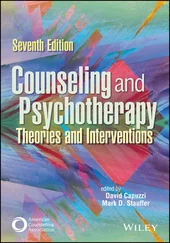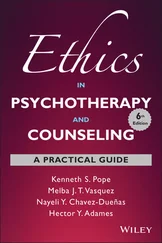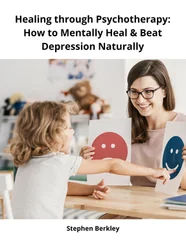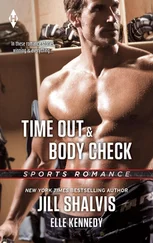V. Ch.: Now, at this moment, what would help you feel a little bit better?
C. D.: A little chat… yes, that’s right… and a good hug would help me.
I covered him with a blanket and held him just as he was, in the foetal position, and I urged him to breathe a little more deeply. He realised, as he was speaking, that the lump in his throat had shrunk. The physical contact and the way I was holding him, with no conditions attached, were doing him good. Somebody was there for him, only for him, without expecting anything from him and without judging him. He remained in this position for quite a long time, as if he were in the nourishing environment of the womb and being nourished by it. His body relaxed, his breathing became deeper and calmer. Slowly he uncurled his body and stretched out his limbs, taking his time. Now he could feel his pelvis; now he could feel his legs and he began to play around with them; he lifted them up and looked at them… He moved the back of his neck around and then… opening his eyes, he gazed up at me like a young baby. He was like a young baby that was still receiving its mother’s attentions and he felt good. He remained lying down and, as he looked up, I smiled at him and, pulling gently on his hands, raised him up slightly. His head fell slightly backwards; his neck was slacker now… He began to respond to my smile and said that he felt ‘different’ at being able to read it well. I asked him not to exert himself at all, but just let himself go and feel what it was like for his body to be lifted up just a short way, only with my help. This was a brand new experience for him… having somebody concern themselves solely with him in a joyful and unhurried way.
Once he had experienced this different ‘now’ and registered it in his system, he was ready to move on to raising himself up through his own efforts and my support. I gave him my hands, he held on to them and, using the strength of his own arms, raised himself up a little. This was also a new experience for him and felt good too. It felt good having someone to support him, to look at him with a joyful expression and in a way that was not only non-judgmental but also encouraging. He took his time, turned over onto his front, discovered what it was like to crawl on all fours with an adult nearby to support him, and then sat down on the floor. It was now time to support his back and the back of his neck so that, with the soles of his feet and his palms planted firmly on the ground and breathing deeply from his stomach, he could feel what it was like to raise his head. It was a truly novel experience for him… He felt so strong that he pushed down firmly and stood up straight. He felt taller than he had ever been before…
Now I’m not afraid. I know it and I can tell my parents, ‘Look, I’m strong now and whether you criticise me or not is your business; it doesn’t bother me.’
Of course, getting to the point where his parents’ criticism no longer bothered him was going to take more time and treatment. Even so, we had made good progress.
From Reich to Lowen and from Lowen to biosynthesis
In body psychotherapy there are no predefined working methods relating to body posture. Together with Reich, we recognise that the lying-down position is an important one because it helps the patient to regress easily and in some cases this is very useful. It can lead us quickly to the patient’s childhood, although as Alexander Lowen has shown, this is not an adult posture. Thus, when we want to strengthen the adult part of the patient, we want them to stand firmly on their own two feet and, as we say, to be ‘well grounded’ – a term introduced by Lowen. In our focus on vertical grounding we aim at the adult part of the patient.
In biosynthesis we do not simply move between these two positions. Recognising the importance of both, we move on to form a new synthesis, stressing the importance of an effective union of the upper and lower parts of the body and then of a grounding of both, the legs-pelvis and the head. This is precisely what I applied in my treatment of C. D. We began our therapy sessions in a seated position; later he felt the need to lie down and his system did in fact lead him, regressively, to recall childhood experiences. Then he moved into the womb, where he stayed to take nourishment for as long as he needed, then, together, step by step, we discovered the spinal column and the adult posture, in which he was able to view his parents on equal terms and through his experience with his parents enter a society of equals on equal terms. (This particular session lasted one and a half hours. I would like to stress the fact that in the experiential exercises and the individual issues that we dealt with in this therapy session we returned repeatedly to the same exercises and issues until they had been mastered and fully integrated by the patient’s system.)
Hence the unifying spinal column has its place in biosynthesis. Grounding is to do with the grip we have on the ground, the grip we have on physical reality, on the natural process of life. Our work, the obligations of our own individual reality, money, the management of space and time, are all connected with grounding. If I have a firm grip on the ground, I know who I am, I know where I stand and I know where I am going. But how can I have a firm grip on the ground, know who I am and where I am going if I don’t have a healthy spinal column and a well-grounded head? We sometimes say of people that they are ‘spineless’, that they don’t ‘stand up to others’ or that they ‘can’t hold their head up high’, by which we mean that they cannot offer any resistance and it is hard for them to deal with other people on equal terms.
The head is grounded through the neck to the spinal column. The first time the head is grounded is at birth. This becomes clear and easy to understand when we come across people who did not have the opportunity to be born head first or who were born head first but in too easy a manner, like a patient of mine who, when her mother was left on her own and without a midwife instructing her when to push, not only emerged without medical assistance but also – as nobody was there to hold her – fell onto the floor. It took months of work to help this patient to be able to stand on her own for a while, unsupported and with eyes closed, without being afraid that she might fall over. One form of physical contact we have which still gives her great joy and fulfilment is when we stand with our legs apart, place our heads together and she gently works her neck. ‘It feels like we are forming a perfect circle,' she tells me. ‘Your energy passes through your head into mine, goes through my body, enters the ground, travels through the ground and up into your body, rises up into your head and then from your head passes into my own head again. Isn't it a wonderful feeling?’
For those of us who work in biosynthesis, then, grounding is not merely to do with the ground and the feet; it is to do with a good bond between the head, the pelvis and the feet. In effect, we are talking about a functional spinal column. What we are aiming to achieve is a strong and flexible spinal column. We should always view the upper and lower parts of the body, as well as the front and the back, as functional units; in functional terms, they are a single unit and we should treat them as such, as being all inter-related. If, for example, there is a surplus of energy in the head, there will be a deficiency elsewhere.
Truth: the best protection from the inevitable
Each of us is born with a certain amount of energy and this does not change. Our body is built with this energy, as are our defences. Often, human experiences are of such a kind that our defences, instead of being flexible and able to adapt to every case in which they are needed, freeze our energy, trapping it in the body and building character-structures. Character-structures are particularly energy-consuming, limiting the amount of energy an individual has to spend on play and joyful activities, on creating relationships, expressing anger and fear, on developing their creative abilities and, of course, on expressing all the other emotions, life attitudes and behaviours. Sometimes, on a patient’s face, we can see pain and sadness frozen like a mask, with tears that were never shed frozen in their eyes because when they lost a parent suddenly and prematurely in their childhood, they were prevented from joining in the collective mourning by adults who wished to ‘protect’ them.
Читать дальше
